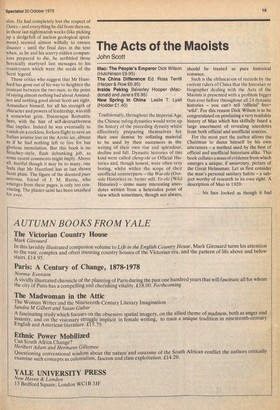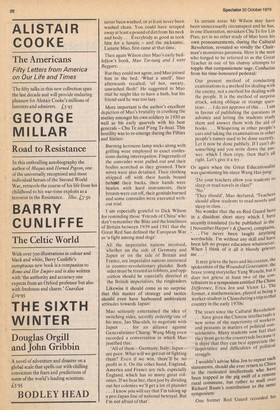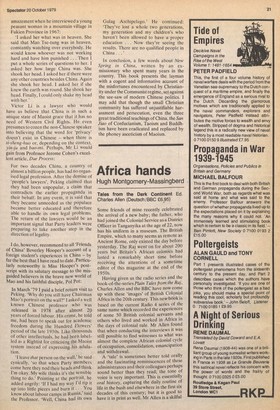The Acts of the Maoists
John Scott
Mao: The People's Emperor Dick Wilson (Hutchinson £9.95) The China Difference Ed. Ross Terrill (Harper & Row £6.95) Inside Peking Beverley Hooper (Macdonald and Jane's £6.95) New Spring in China Leslie T. Lyall (Hodder £1.40) Traditionally, throughout the Imperial Age, the Chinese ruling dynasties would write up the history of the preceding dynasty whilst effectively preparing themselves for their own demise by collating material to be used by their successors in the writing of their own rise and splendour, decline and fall. Dynastic histories of this kind were called zheng-shi or Official Histories and, though honest, were often very boring, whilst within the scope of their unofficial counterparts — the Wai-shi (Outside Histories) or, better still, Ye-shi (Wild Histories) — come many interesting anecdotes written from a heterodox point of view which sometimes, though not always, should be treated as pure historical romance.
Such is the obfuscation of records by the current rulers of China that the historian or biographer dealing with the Acts of the Maoists is presented with a problem bigger than ever before throughout all 24 dynastic histories — you can't tell 'official' frot'wild'. For this reason Dick Wilson is to be congratulated on producing a very readable history of Mao which has skilfully fused a large assortment of revealing anecdotes from both official and unofficial sources.
For the most part the author allows the Chairman to damn himself by his own utterances — a method used by the best of official and unofficial historians alike. This book collates a mass of evidence from which emerges a unique, if unsavoury, picture of the Great Helmsman. Let us first consider the man's personal sanitary habits — a subject worthy of research in its own right. A description of Mao in 1920: . . . his face looked as though it had never been washed, or at least never been washed clean. You could have scraped away at least a pound of dirt from his neck and body. . . Everybody as good as took him for a lunatic — and the nickname, Lunatic Mao, first came at that time.
Then again Wilson cites Mao's early bedfellow's book, Mao Tse-tung and 1 were Beggars: But they could not agree, and Mao joined him in the bed. 'What a smell', Siao afterwards recalled, 'of hot, sweaty, unwashed flesh!' He suggested to Mao that he might like to have a bath, but his Friend said he was too lazy.
More important is the author's excellent depiction of Mao's brutality in crushing the mutiny amongst his own soldiery in 1930 as well as his early quarrels with his best generals — Chu Te and P'eng Te-huai. This hostility was to re-emerge during the Fifties and Sixties: Burning kerosene lamp wicks along with grilling were employed to exact confessions during interrogation. Fingernails of the comrades were pulled out and their bodies scorched as they groaned. Their wives were also detained. Their clothing stripped off with their hands bound behind their backs, their hands were beaten with hard instruments, their breasts were cut off, their genitals burned and some comrades were executed without trial.
I am especially grateful to Dick Wilson for reminding those 'Friends of China' who don't remember the Blitz and the loneliness of Britain between 1939 and 1941 that the Great Red Sun defined the European War as 'a fight among mad dogs'.
All the imperialist nations involved, whether on the side of Germany and Japan or on the side of Britain and France, are imperialist nations interested in counter-revolutionary plunder. Both• sides must be treated as robbers, and opposition should be especially directed at the British imperialists, the ringleaders.
Likewise it should come as no surprise that this master of strategy and tactics should even have harboured ambivalent attitudes towards Japan: Mao seriously entertained the idea of switching sides, secretly ordering one of his men, Jao Shu-shih, to negotiate with Japan . . . for an alliance against Generalissimo Chiang. Wang Ming even recorded a conversation in which Mao justified this: 'All of them — Germany, Italy, Japan — are poor. What will we get out of fighting them? Even if we win, there'll be no profit in it. On the other hand, England, America and France are rich, especially England, which has so many great colonies. If we beat her, then just by dividing out her colonies we'll get a lot of plunder . .1 know you will say that I'm taking up a pro-Japan line of national betrayal. But I'm not afraid of that'. In certain areas Mr Wilson may have been unnecessarily circumspect and he has, in one illustration, mistaken Chu Te for Lin Piao, yet in no other study of Mao have his own pronouncements, during the Cultural Revolution, revealed so vividly the Chairman's monstrous paranoia. Here is the man who longed to be referred to as the Great Teacher in one of his clumsy attempts to topple that compassionate sage, Confucius from his time-honoured pedestal: Our present method of conducting examinations is a method for dealing with the enemy, not a method for dealing with the people. It is the method of surprise attack, asking oblique or strange questions. . . I do not approve of this . . I am in favour of publishing the questions in advance and letting the students study them and answer them with the aid of books . . . Whispering in other people's ears and taking the examinations in other people's names used to be done secretly. Let it now be done publicly. Ill can't do something and you write down the answer, which I then copy, then that's all right. Let's give it a try.
Or again when the Great Educationalist was questioning his niece Wang Hai-jung: `Do your teachers allow you students to sleep or read novels in class?'
`No.'
'They should', Mao declared, 'Teachers should allow students to read novels and sleep in class . .
No wonder that the ex-Red Guard hero in a dissident short story which I have recently translated (to be published in the 1 November Harper's & Queen), complains, I've never been taught anything worthwhile. I'm without any skill and have been left no proper education whatsoever. When I think of it all it bloody grieves me . . . '
It may grieve the hero and his creator, the spokesman of the Wounded Generation, the brave young storyteller Yang Wenzhi, but it does not grieve at least two of the contributors to a symposium entitled The China Difference, Erica Jen and Victor Li. The former, a mathematician, played at being a worker-student in China during a trip to that country in the early 1970s: The years since the Cultural Revolution . . . have given the Chinese intellectuals a new sense of the superiority of workers and peasants in matters of political consciousness. Many students now feel that they must go to the countryside because it is there that they can best appreciate the importance and difficulties of political struggle.
I wouldn4t advise Miss Jen to repeat such statements, should she ever return to China to the rusticated intellectuals who have been trapped in the pig swill of a remote rural commune, but rather to mull over Richard Baum's contribution to the same symposium: One former Red Guard recorded his amazement when he interviewed a young peasant woman in a mountain village in Fukien Province in 1967: 'I asked her what was in heaven. She said that Mao Tse-tung was in heaven, constantly watching over everybody. He would know whoever was not working hard and have him punished . . . Then I put a whole series of questions to her. I asked her how large China was. She shook her head. I asked her if there were any other countries besides China, Again she shook her head. I asked her if she knew the earth was round. She shook her head. Finally, I could only shake my head with her.'
Victor Li is a lawyer who would have us believe that China is in such a unique state of Maoist grace that it has no need of Western Civil Rights. He even presumes to cozen the non-Chinese speaker into believing that the word for 'privacy' doesn't exist in Chinese — when there is si-sheng-huo or, depending on the context, yin-jr and bao-mi. Perhaps, Mr Li would gain from Professor Jerome Cohen's excellent article, Due Process: For two decades China, a country of almost a billion people, has had no organised legal profession. After the demise of 'people's lawyers', Peking claimed that they had been unpopular, a claim that contradicts the earlier propaganda in their behalf. In any event, it is said that they became unneeded as the populace became better educated and therefore able to handle its own legal problems. The return of the lawyers would be an important signal that Party leaders were preparing to take another step in the direction of legality.
I do, however, recommend to all 'Friends of China' Beverley Hooper's account of a foreign student's experiences in China — by far the best that I have read to date. Particularly noteworthy is Miss Hooper's postscript with its salutary message to the misguided believers in the brave new world of Mao and his faithful disciple, Pol Pot: In March '79 I paid a brief return visit to Peking. 'Why do you still have Chairman Mao's portrait on the wall?' I asked a well known Chinese professor who was released in 1978 after almost 20 years of forced labour. His crime, he told me, had been to speak out for academic freedom during the Hundred Flowers' period of the late 1950s. Like thousands of other intellectuals, he had been labelled as a Rightist for criticising the Maoist system instead of expressing his Ouladon.
'I leave that person on the wall,' he said cynically, 'so that when Party members come here they nod their heads and think I'm okay. My wife thinks it's the sensible thing to do.' Pointing at the portrait, he added angrily: 'If I had my way I'd rip it up into little pieces and burn it . • • You know about labour camps in Russia,' said the Professor. 'Well, China had its own Gulag Archipelago.' He continued: 'They've lost a whole two generations, my generation and my children's who haven't been allowed to have a proper education . . . Now they're seeing the results. There are no qualified people in China . . . '
In conclusion, a few words about New Spring in China, written by an exmissionary who spent many years in the country. This book presents the layman with a cogent and informative account of the misfortunes encountered by Christianity under the Communist regime, set against the see-saw of modern Chinese politics. I may add that though the small Christian community has suffered unjustifiable harassment and persecution, even the three great traditional teachings of China, the San Jiao of Confucianism, Taoism and Buddhism have been eradicated and replaced by the phoney asceticism of Maoism.








































 Previous page
Previous page